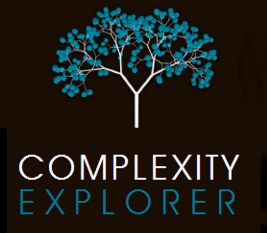| Going Further Into Complexity With Santa Fe Institute |
| Written by Sue Gee | |||
| Saturday, 13 July 2013 | |||
|
The Santa Fe Institutes's inaugural presentation of Introduction to Complexity, a MOOC based on its Complexity Explorer platform, has officially ended. This course is of interest to computer scientists so it is good to know that a revised version will start in September are there are plans for other courses. The Santa Fe Institute (SFI), founded in 1984 is a private, non-profit research center that has pioneered the field of complex systems science.
On its FAQ page it gives this explanation of its transdisciplinary area of study: Complex systems research attempts to uncover and understand the deep commonalities that link artificial, human, and natural systems. By their very nature, these problems transcend any particular field; for example, if we understand the fundamental principles of organization, we will gain insight into the functioning of such systems as cells in biology, markets and firms in economics, and phase transitions in physics and human social systems. This research relies on theories and tools from across the sciences. SFI already provided summer schools and engaged in educational outreach when it decided to establish Complexity Explorer as a web-based repository of educational materials related to complex systems science which would offer massive online courses. The initial one on the platform, Introduction to Complexity, was authored and taught by Melanie Mitchell, Professor of Computer Science at Portland State University. It was a 12-week course with a workload of 3-6 hours per week, spent viewing video lectures, interspersed with quizzes, plus weekly assignments. It wasn't just theoretical; the experimental element was provided by the open source modeling language NetLogo to explore topics in the syllabus, which ranges over chaos, fractals, information theory, genetic algorithms, urban scaling and networks. John Conway's Life and Stephen Wolfram's classification of cellular automata are also explored by NetLogo. Melanie also included a weekly "Guest Spot" in the timetable in which she discussed specific aspects of complex systems with academics from varied backgrounds - theoretical physics, biology, evolution, computer science and so on. Over 7,000 people enrolled on the course and a total of 1176 finished the course successfully (i.e with a total course score of 60% or greater. The apparently high "drop out" rate may have been partly due to teething troubles the course suffered in its first rollout, including delays in video content being available and a few weeks without a Forum for students to exchange ideas and have questions answered by the course staff. On the other hand many enrollees may have sampled it and decided it was pitched at the wrong level. Much better retention and success rates are indicated by two other statistics:
Many of those who finished are eager for more and the following courses have now been announced: January 2014: Introduction to Dynamics and Chaos Spring 2014: Agent-Based Modeling in Netlogo Summer 2014: Mathematics for Complex Systems Fall 2014: Nonlinear Dynamics (with calculus) Meanwhile a revised, improved version of Introduction to Complexity, is due to start September 30, 2013 and is highly recommended for anyone who wants a different and illuminating approach to some of the things you may already know about, such as Mandelbrot fractals, Shanon's information theory and network theory. The course also offers optional homework assignments programming NetLogo, a platform that deserves to be better known. If you want to know more about it, see our Getting Started With NetLogo.
More InformationRelated ArticlesJune Computing MOOCs and Open Courses Free Online Computer Science Courses Starting February
To be informed about new articles on I Programmer, install the I Programmer Toolbar, subscribe to the RSS feed, follow us on, Twitter, Facebook, Google+ or Linkedin, or sign up for our weekly newsletter.
Comments
or email your comment to: comments@i-programmer.info
|
|||
| Last Updated ( Sunday, 14 July 2013 ) |



